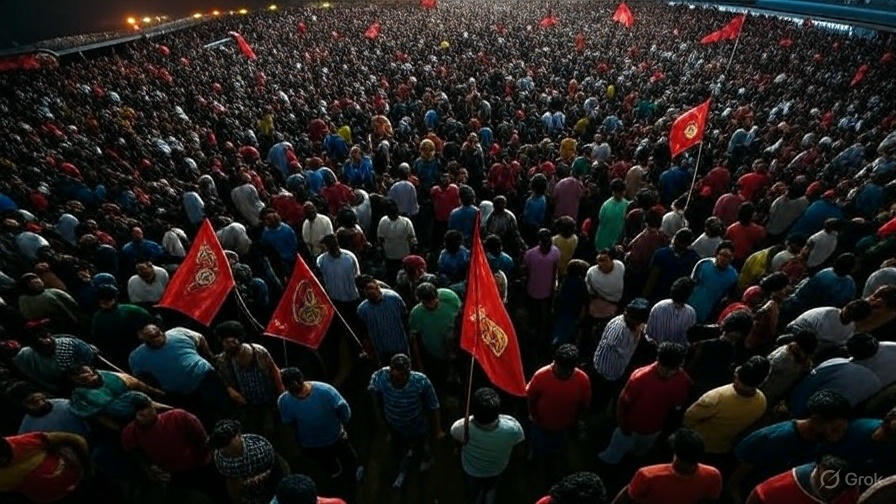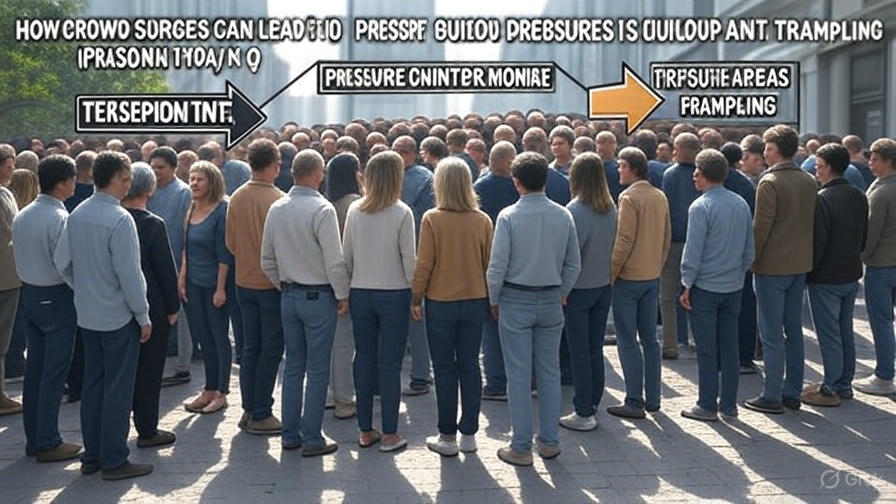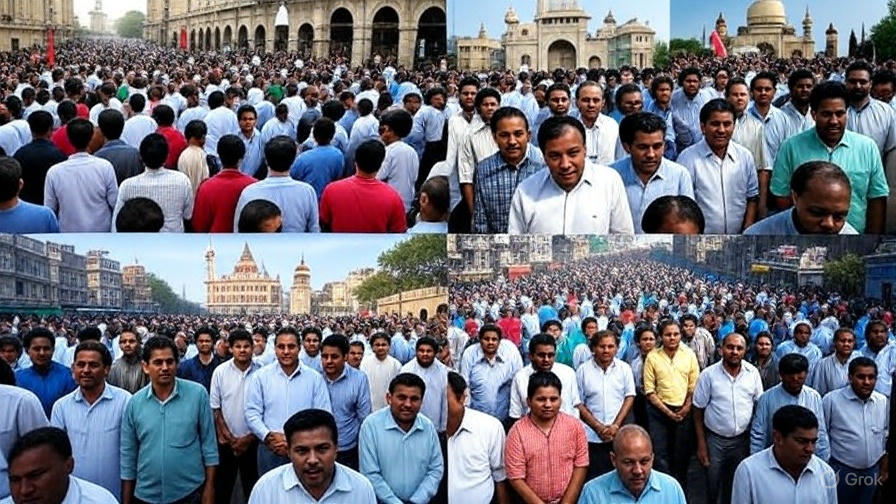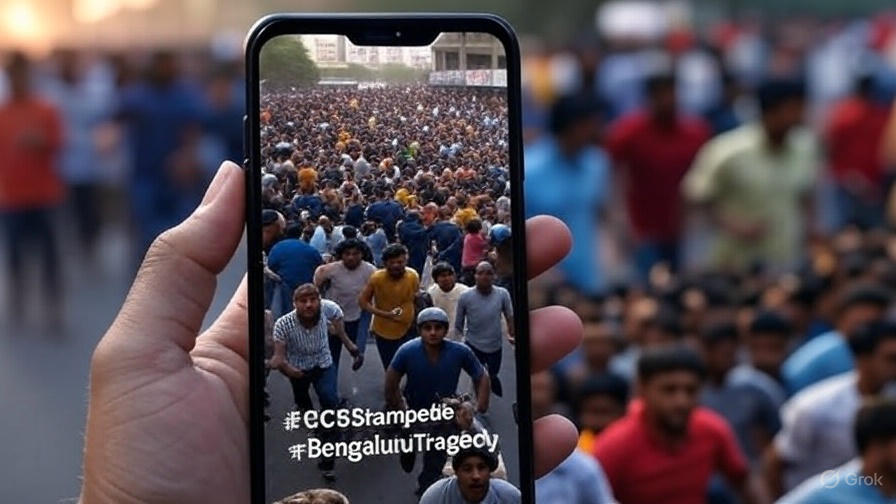A tragic stampede at RCB’s IPL victory parade in Bengaluru left 11 dead. Here’s what caused it and how we must act to prevent future chaos.
Stampede at RCB Victory Parade: How Celebration Turned to Tragedy in Bengaluru

Table of Contents
- What Happened: The Tragic Night at Chinnaswamy
- A City Rejoices—Then Reels
- RCB’s Historic IPL Victory: The Emotional Build-up
- Crowd Dynamics: How Stampedes Begin
- Timeline of the Bengaluru Stampede
- Eyewitness Accounts: Horror in the Crowd
- Emergency Response: Delays, Chaos, and Lessons
- The Aftermath: Who’s Responsible?
- Official Statements and Reactions
- Crowd Control in India: A Systemic Problem
- Public Safety Protocols and Where They Failed
- Psychological Toll on Survivors
- Similar Incidents in India’s History
- How to Prevent Future Stampedes
- Social Media’s Role in Unfolding Events
- RCB Fans Mourn: From Glory to Grief
- Voices from the Ground: Real People, Real Loss
- Legal and Political Ramifications
- Urban Planning and Event Management Lessons
- Final Thoughts: The Cost of Celebration
1. What Happened: The Tragic Night at Chinnaswamy
June 3, 2025, was meant to be a night of joy. The streets of Bengaluru thrummed with excitement as Royal Challengers Bengaluru (RCB), after years of heartbreak, finally lifted the IPL trophy.
Thousands of fans swarmed to Chinnaswamy Stadium for an open-top bus parade and celebration. But what started as joyous chanting turned into panic, screaming, and crushing chaos.

2. A City Rejoices—Then Reels
RCB’s loyal fan base—famously nicknamed the “12th Man Army”—had waited nearly two decades for this moment. The city had been buzzing since the semifinal win. The final victory led to spontaneous street celebrations.
But no one expected the scale of turnout—an estimated 150,000 people squeezed into streets and stadium perimeters with no crowd regulation strategy in place.
3. RCB’s Historic IPL Victory: The Emotional Build-up
The IPL 2025 final was a nerve-wracking match. Virat Kohli, now mentor, cheered on as young captain Rajat Patidar sealed the win. For fans, it was redemption.
“We were ready to wait all night just to catch a glimpse of the trophy,” said Nithin, 24, who was among the crowd.
But victory euphoria spiraled into organizational negligence.
4. Crowd Dynamics: How Stampedes Begin
A stampede isn’t just people pushing—it’s a domino effect. Experts describe it as a pressure wave caused by too many bodies, confined spaces, and one triggering panic.
In this case: a barricade collapse near Gate 3, followed by people at the back pressing forward.

5. Timeline of the RCB Bengaluru Stampede
- 4:30 PM – Fans start gathering outside Chinnaswamy.
- 6:00 PM – Roads around MG Road, Cubbon Road blocked by masses.
- 7:15 PM – Gates opened for the celebration.
- 7:30 PM – Barricade collapse near one of the VIP sections.
- 7:45 PM – Stampede begins as crowd surges.
- 8:00 PM – Ambulances struggle to reach the site.
- 9:30 PM – Police declare Level-3 emergency.
6. Eyewitness Accounts: Horror in the Crowd
“I saw a girl fall and vanish into the crowd. People just ran over her,” said Mahesh, a vendor near the East Gate.
Many report children screaming, shoes scattered, and phones lost in the scuffle. Some climbed trees and fences to escape.

7. Emergency Response: Delays, Chaos, and Lessons
Ambulances couldn’t move through the crowd. A lack of emergency lanes, missing first-aid stations, and no evacuation drills meant response time stretched dangerously long.
Doctors at nearby Mallya Hospital report more deaths from suffocation than injuries—a sign of crushing pressure from the crowd.
8. The Aftermath: Who’s Responsible?
While Bengaluru Police claim they had deployed 1,000 officers, no coordination between RCB officials, BBMP, and law enforcement was in place. Crowd barriers were limited, and entry gates were overwhelmed.
Critics argue the BBMP granted permits without proper risk assessments.
9. Official Statements and Reactions
- Chief Minister Siddaramaiah: “A full inquiry will be conducted. ₹10 lakh compensation for each victim.”
- BCCI: “This was not a BCCI-organized event. Safety should’ve been prioritized.”
- PM Modi: Expressed grief, called for stricter mass-gathering protocols.
10. Crowd Control in India: A Systemic Problem
India has a long, tragic history of stampedes—Kumbh Melas, religious yatras, or public events. The core issue: planning doesn’t match scale.

11. Public Safety Protocols and Where They Failed
Experts say minimum requirements for crowd management were ignored:
- No live crowd monitoring
- Insufficient barricades
- No loudspeaker guidance
- No trained crowd marshals
12. Psychological Toll on Survivors
PTSD among survivors is common. Survivors recall panic attacks, nightmares, and survivor’s guilt. For many, the trauma is lifelong.
“Every time I hear a crowd cheer, I freeze,” says Ananya, a 19-year-old college student who lost her friend in the crush.
13. Similar Incidents in India’s History
- 2013 Allahabad Kumbh Mela: 36 dead
- 2008 Chamunda Devi stampede, Jodhpur: 224 dead
- 2015 Godavari Pushkaram, Andhra: 27 dead
Lessons were discussed then. Were they implemented? Evidently not.
14. How to Prevent Future Stampedes
Key prevention tactics:
- Smart crowd mapping using drones and AI
- Controlled access through digital passes
- Emergency evacuation drills
- Proper training for marshals
- Medical tents every 100 meters
15. Social Media’s Role in Unfolding Events
While traditional news lagged, X (formerly Twitter) was flooded with:
- SOS posts
- Videos of the chaos
- Missing person alerts

16. RCB Fans Mourn: From Glory to Grief
Victory turned bittersweet. RCB captain addressed fans, saying, “Cricket is joy—but not at the cost of lives. We mourn with you.”
Fans lit candles outside the stadium, draping RCB flags with black ribbons.
17. Voices from the Ground: Real People, Real Loss
Each number is a name:
- Pooja, 16, aspiring athlete
- Rafiq, 42, auto driver
- Geetha, 62, RCB superfan
These stories must be remembered, not just as statistics, but as humans lost in a system failure.
18. Legal and Political Ramifications
An FIR has been filed. Human Rights Commission has taken suo moto cognizance. Political blame games between the ruling party and opposition are heating up.
19. Urban Planning and Event Management Lessons
Bengaluru’s infrastructure is strained. More mega-events need:
- Crowd simulation testing
- Pre-event stakeholder meetings
- Real-time alerts via public apps
20. Final Thoughts: The Cost of Celebration
This wasn’t just an accident. It was a man-made disaster—a lethal mix of joy, mismanagement, and oversight.
“Let this be the last time we celebrate without planning,” a fan posted online.
